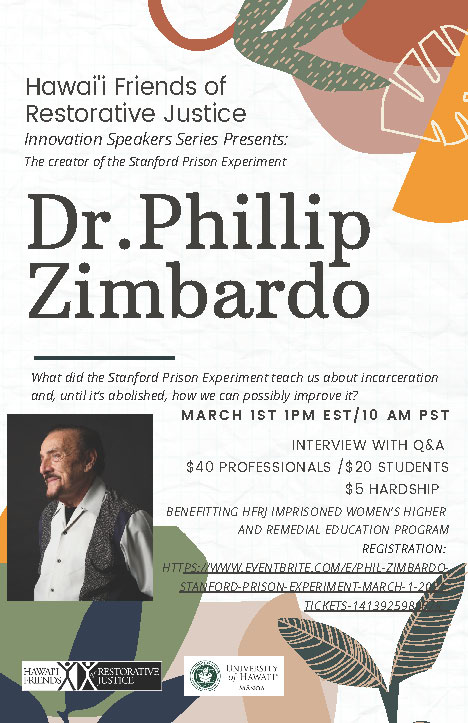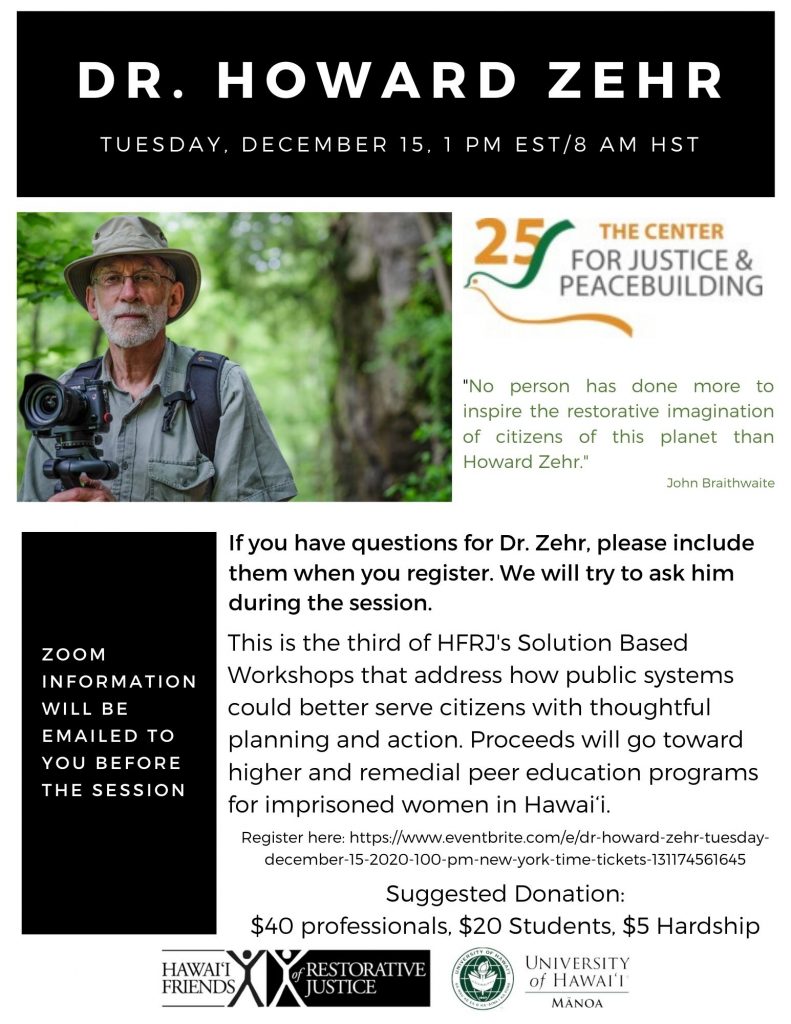Category Archives: News
Hawai’i Friends Summer 2024 Newsletter
Hawai’i Friends Winter 2023 Newsletter
Hawai’i Friends Summer 2023 Newsletter
Iceland’s Approach to Reentry ppt Presentation June 2, 2023
Interview of Deoersad Ramoutar
by Lorenn Walker December 2022
Mr. Ramoutar was Acting Commissioner of Prisons, Trinidad Tobago, at the time of the interview.
Introduction:
Right before this interview was recorded Commissioner Ramoutar was asked: “What do you think prisons need the most?”
He replied “love.”
Deoersad Ramoutar:
Name is Deoersad Ramoutar. I am the Acting Commissioner of Prisons of Trinidad Tobago Prison Service. I am approximately 10 years in office, but I have 34 years in the service and still going strong.
I joined this service in 1988 as a basic grade officer and worked my way to the top. Whilst in the system… Well out of the system I didn’t care much about prisoners, I just cared for a salary and a permanent job. Unfortunately for me, when I got that, I had some life changing moments in my life by-
Lorenn:
Can I ask what they were?
Deoersad Ramoutar:
Interacting with inmates and hearing their life stories and realize that in fact there is one inmate, godson Neptune. God bless his soul, he has passed on. He and I had regular conversations, mature conversations, and he inspired me to do studies to get back.
Lorenn:
He inspired you to go back to college?
Deoersad Ramoutar:
Yes. Yes. He himself was one of the most educated person in the system. He was a top executive at a particular company and he was charged for murder of his wife and he came in the system.
Lorenn:
Yes.
Deoersad Ramoutar:
So in that point of being high, he-
Lorenn:
Killed her.
Deoersad Ramoutar:
Yeah, he killed her. Yes. So come back to introducing myself.
Lorenn:
He inspired you to go to college?
Deoersad Ramoutar:
Yes. Yes.
Lorenn:
And the inmates and the guards both?
Deoersad Ramoutar:
Yes.
Lorenn:
You could talk to both?
Deoersad Ramoutar:
Yes. So I focus my studies into social work counseling. I studied sociology, psychology, criminology. Actually, social work is an elective discipline where you need to study all other
disciplines and make yourself a good social worker. So having done that, I got caught up in it. I enjoyed that type of work. So I was enjoying my work as a hobby. It became a hobby working. So I wasn’t working a day in my life.
Lorenn:
You love your work?
Deoersad Ramoutar:
Yeah, I love my work. Happy with my salary. First doing something I love to do. And then when you help someone, when you really help someone and they thank you for that, show gratitude, that gives you a better feeling than your salary.
Lorenn:
Spend money.
Deoersad Ramoutar:
I have tried to, instill my thoughts and my perception of life onto inmates, officers, mostly the inmates. Because as a colleague you may not get all that privilege of what you’re worth because you will be competing for the same position in work. You’ll be become competing for authority.
So the inmates would really see who we are. Inmates would gravitate towards me for advice counseling and I would easily control them, just with my words. So that was a plus for me. So I joined the department, known as the Welfare Department in Prison Service where my social work experience allowed me to do social work for the inmates because the regular run-of-the- mill guard can’t do that. Cannot do that. Cannot be too interactive with inmates and your home families and so on. It could lead to corruption.
Lorenn:
But the social worker can?
Deoersad Ramoutar:
A social worker can.
Lorenn:
And you were a social worker?
Deoersad Ramoutar:
Trained, unemployed.
Lorenn:
Okay.
Deoersad Ramoutar:
Because the prison has a opportunity for the guard to become a social worker and we call that welfare officer. Got so much deeply involved in the humanistic approach. In treatment people I decided to really further myself into this discipline. So I went on to do restorative justice, mediation.
My prior commissioners were trained mostly in security and they did an excellent job in security. I suppose rehabilitating someone is the most difficult job. You have to be really patient. You have to care. So the easier thing to do was security. I’m up for the challenge. Now I’m faced with a quality of change. I might come across sometime to my staff and colleagues as being too soft. But it’s not soft, it’s planting a seed.
Lorenn:
They think you’re soft.
Deoersad Ramoutar:
Yes. At times I have to let them know I am not.
Lorenn:
Right.
Deoersad Ramoutar:
For the 10 months I’m here I think it’s working. I’ve developed two watch words, respect and performance. And I tell you, I say to my inmates and to my staff, do everything you do with respect, be respectful. And I think everything under the sun will be good if you do everything you do under those respectful and do your job.
I have two other watch words for 2023, motivation and empowerment. I think that inmates who come to our system are broken men and women, really broken psychologically, spiritually, mentally.
We have trained trainers programs, so they’re now to go out and have classroom settings with my inmates and deal with their emotions more than anything else. This is so much more exciting dealing the human psyche, as opposed to just locking up in a cell, allowing you to eat, have your dinner, your lunch, your breakfast, have a bath and go back in your cell. That’s boring.
Lorenn:
And what are you most proud of, you accomplished?
Deoersad Ramoutar:
I think the inmates, they love what you do. And you feel lucky they may love you afterwards and then they will start to love the other officers going down the road. I just came from a program down at South in Clarkson where we have the elderly population. We are treating them differently. I’m allowing their grandchildren, because they’re in system with us 30, 35 years now and building their self-esteem. They were self for self-worth. I’m allowing family visits because we never had that before to the equality I’m having now. I’m allowing them to walk with a picnic basket. So they’re around a table having picnic with their food, home cooked food for their inmate’s family.
They’re tearful when they enjoying program. So the children, they cry before they leave, they don’t want to leave. Try to give you a sense that I appreciate you. I try to have more monitoring taking place so when someone feels they’re being monitored, what they’re doing are being scrutinized, they feel cared for. And they respond better. And if your work was not being of acknowledge or appreciated, you are less motivated to repeat it.
And if I, through my managers, we show you appreciation what you do, not just for the prisons but for the country, that what works.
Lorenn:
Tell me, have you done any restorative justice practices in here or do you have plans?
Deoersad Ramoutar:
Hundreds, hundreds of situation instances. I’m removing the bullseye target from my officers. So try not to kill my officers anymore. Someone asked me where are you going to put it? Where are you going to put this bullseye? Is it only police? Is it only judiciary? Is it the businessman? No, I’m going to put it on the mirror that the inmate is looking to. The man in the mirror, is where you are going to-
Lorenn:
Make a choice.
Deoersad Ramoutar:
… put that bulls eye [on you], because you are the one that put yourself here.


